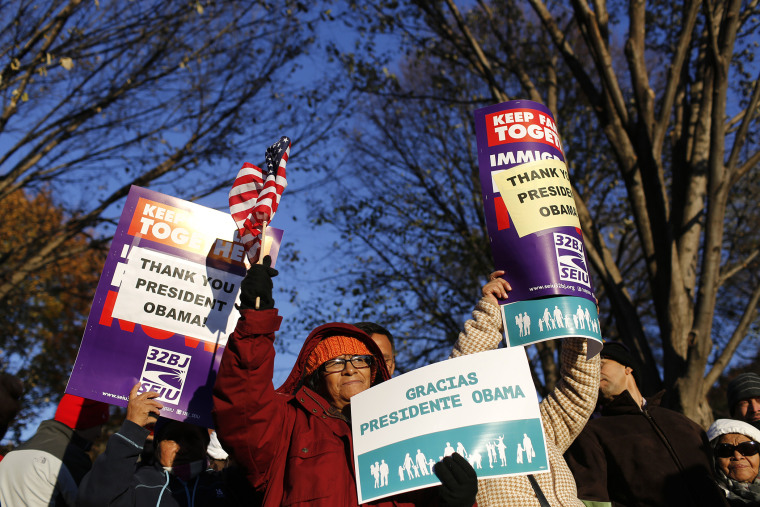A dozen states that back President Obama's immigration actions are now upping the ante with their support, filing arguments with the courts that the legal challenges to the looming measures don't hold water.
In a "friend of the court" brief filed Monday, attorneys general from 12 states and the District of Columbia threw their backing behind the president's executive actions, which could help nearly 5 million undocumented immigrants who currently live in the U.S., allowing them to seek work without fear of deportation.
RELATED: Immigration action 2.0: Lessons learned from DACA
Officials from 12 states -- Washington, California, Connecticut, Hawaii, Illinois, Iowa, Maryland, Massachusetts, New Mexico, New York, Oregon and Vermont -- and the District of Columbia filed the brief Monday in the U.S. District Court for the Southern District of Texas. In it, the attorneys general argue that enabling families to fully participate in U.S. society will have a positive impact on wages and local economies.
"The truth is that the directives will substantially benefit states, will further the public interest, and are well within the president's broad authority to enforce immigration law," they write.
The "friend of the court" filing is the latest in what could become a drawn-out legal battle over the implementation of the executive actions. In November, state leaders responded swiftly to President Obama's announcement to extend a program that benefits so-called DREAMers, or undocumented immigrants brought to the U.S. as children. Within weeks of the announcement, Republican leaders from 24 states came out against the action, arguing it went beyond the scope of the president's authority.
Preliminary hearings for the challenge begin in the Southern District of Texas court on Thursday, when attorneys for Texas, the lead plaintiff in the case, are expected to ask the federal district court for a preliminary injunction to block the upcoming measures while the states make their arguments. The district court judge hearing the case, Andrew Hanen, is a conservative judge appointed by President George W. Bush and who previously has been publicly critical of the Obama administration's policies on immigration. But what remains unclear is whether the arguments provided by the states are strong enough to bring down the actions before they are even implemented.
RELATED: States’ challenge to Obama immigration action gathers steam
The impending executive actions are expected to be rolled out in two phases. The first expands on an existing program called DACA -- Deferred Action on Childhood Arrivals -- which benefits young DREAMers by allowing them to receive a renewable two-year work permit, obtain drivers licences and pay taxes. Starting as soon as February, the age ceiling for those who qualify will be raised, opening the door for hundreds of thousands more to apply. The most dramatic changes will kick in by May, when a similar program will open up to the parents of U.S.-born citizens.
The states challenging the program argue that Obama does not have the authority to make a sweeping directive changing which undocumented immigrants are priorities for deportation, and which ones are not. The White House has argued repeatedly that since the federal government does not have the resources or will to deport the estimated 11 million undocumented immigrants who currently live in the shadows, the president can use prosecutorial discretion to prioritize those deportations.
A number of legal experts agree that states face an uphill battle in their fight to derail the coming executive actions. Officials challenging the president's measures must meet a high bar to prove that the state would face irreparable harm as a result. The 12 states involved in Monday's brief argue that bar has not been met.
Washington State Attorney General Bob Ferguson, who filed the "friend of the court" brief on behalf of President Obama's supporters, pointed to the economic factors that show that rather than face harm, a number of states will actually benefit from allowing undocumented immigrants to work legally.
“By properly using his authority to set enforcement priorities, the President’s action benefits Washington and other states by improving public safety, keeping families together, and aiding our economy,” Ferguson said in a statement. “Hard working, tax paying immigrants can now emerge from the shadows.”
